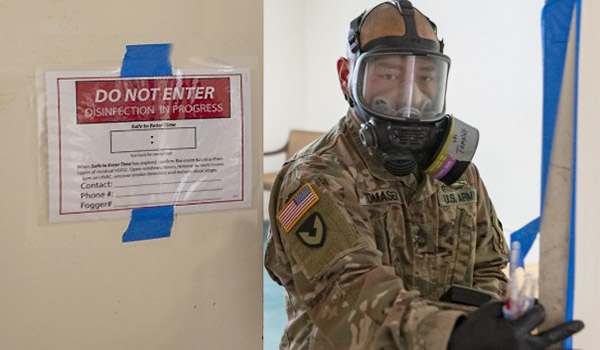
Ask the Flight Surgeon / By CPT(P) Christopher Grace, M.D.: Q: I am a CH-47 flight engineer that will deploy as part of a medical relief mission to Africa. I have heard a lot about people getting sick when they travel to this region. What do I need to know before I leave?
FS: Assignment to the United States Africa Command (USAFRICOM) poses a unique set of medical concerns for military members with aviators being no exception. All aviators should discuss the preventative medicine require-ments for travel to USAFRICOM and their aeromedical impact with their aeromedical provider.
Requirements

Operation United Assistance mission to fight Ebola from U.S. Army Africa to the 101st Airborne Division./Army.mil
Entry into Africa has specific medi-cal requirements set forth by the AFRI-COM Surgeon that may differ from the Army Standards of Medical Fitness (AR 40-501) and Aeromedical Policy Letters. A specific medical screening is required before travel to Africa. Be sure to allow for plenty of time prior to departure to meet with your aeromedical provider to review medical requirements and obtain any necessary labs, immunizations and medications.
Aviators bound for Africa will need to be up to date on routine vaccinations as well as yellow fever (administered at least 10 days prior to departure) and, under certain circumstances, a rabies series may be required as well. Also, do not forget your annual flu-shot. Immunizations re-quire a temporary restriction from flying duty for a minimum of 12 hours. If you need a series of vaccines prior to travel, this may impact your flight duties leading up to your trip, so plan
accordingly.
Disease Prevention
Infectious diseases spread by the bites of flies, fleas, mites, ticks and mosquitoes are of concern. Be sure to use Permethrin treated uniforms and clothing at all times. If your uniforms are not pre-treated, there are kits available for easy self-treatment. Apply DEET bug repellent liberally to any exposed skin and be sure to reapply throughout the day. Always sleep with Permethrin treated bed netting to stop pests from biting you at night. The appli-cation of these chemicals to your clothes and skin should pose very minimal aero-medical concerns. However, be sure to monitor for rare skin sensitivities.
Malaria is an infection of the blood that is transmitted by the bite of a mos-quito and is a major concern in Africa. Luckily, it can be prevented by taking certain medications. Malarone® (Ato-vaquone-Proguanil) is the medication of choice for the prevention of malaria in Africa and is required by USAFRI-COM. It is imperative to take this med-ication as directed by your aeromedical provider including the time prior to de-parture, during your stay and 7 days after leaving. Obtain a large enough supply before leaving to cover your entire trip as it is unlikely you can rely on obtaining more in country. Certain areas within Africa such as Djibouti, Somalia and Ethiopia require further malaria pre-vention medication called Primaquine. This medication is also used upon return from Africa to completely remove all forms of the malaria parasite from the body. All aviators traveling to Africa should have on record their G6PD de-ficiency blood test results. Those with a G6PD deficiency can have severe reac-tions to Primaquine and need to wear red medical alert tags.
Note that travelers to Africa are more likely to receive medical treatment for common illnesses rather than the exotic ones discussed above. Diarrhea, vomiting, colds and allergies are common and can be treated with medications pre-scribed by your aeromedical provider as well as over-the-counter (OTC) medica-tions. As always, consult your aeromedi-cal provider before taking any OTC medication. If they are not immediately available, only Class-1 medications, as out-lined in AR 40-8, are approved for temporary use by aircrew members. All other medications not explicitly classi-fied as a Class-1 in the OTC Medica-tion APL are temporarily disqualifying until you are seen and evaluated by your aeromedical provider.
Austerity
Africa remains one of the most austere operational environments for Soldiers and aviators. Be sure to consider logisti-cal requirements for any regular medical treatment that you require. Obstructive Sleep Apnea (OSA), for instance, can of-ten be effectively treated in an aviator with CPAP. However, treatment with CPAP requires a power source as well as a supply of masks, hoses and cleaning equipment for effective use. Failure to comply with treatment can cause fatigue in an aviator and be a risk to safety in flight. Be sure to bring adequate supplies for any medical device to ensure its continued operation over the duration of your trip.
Homecoming
When you return from your trip to Africa it is important to monitor your health and report any changes for the next 12 months. Remember to report your recent travel to USAFRICOM to your health provider as it may be impor-tant in the diagnosis and treatment of your condition. Fly Safe!
Questions?
If you have a question you would like addressed, email it to AskFS@quad-a. org; we’ll try to address it in the future. See your unit flight surgeon for your personal health issues.The views and opinions offered are those of the author and researchers and should not be con-strued as an official Department of the Army position unless otherwise stated
CPT(P)(Dr.) Christopher Grace is a flight surgeon at the United States Army School of Aviation Medicine, Ft. Rucker, AL.










